ADVANCE FOR USE THURSDAY, JUNE 9, 2016 AND THEREAFTER -In this Sunday April 10, 2016 photo, a parishioner reads the bible before a service at the Christian Fellowship Church in Benton, Ky. The congregation is one of more than 80 in the surrounding community, by pastor Richie Clendenen's count. Yet, even in this deeply religious swath of western Kentucky, a state where about half the residents are evangelical, conservative Christians feel under siege. They say that, for decades, they have been steadily pushed to the sidelines of American life and have come under attack for their most deeply held beliefs. (AP Photo/David Goldman)
The Associated Press
BENTON, Kentucky (AP) - Pastor Richie Clendenen stepped away from the pulpit, microphone in hand. He walked the aisles of the Christian Fellowship Church, his voice rising to describe the perils believers face in 21st-century America.
"The Bible says in this life you will have troubles, you will have persecutions. And Jesus takes it a step further: You'll be hated by all nations for my namesake," he said.
"Let me tell you," the minister said, "that time is here."
The faithful in the pews needed little convincing. Even in this deeply religious swath of western Kentucky - a state where about half the residents are evangelical - conservative Christians feel under siege.
For decades, they say, they have been steadily pushed to the sidelines of American life and have come under attack for their most deeply held beliefs, born of their reading of Scripture and their religious mandate to evangelize. The 1960s ban on prayer in public schools is still a fresh wound. Every legal challenge to a public Nativity scene or Ten Commandments display is another marginalization. They've been "steamrolled," they say, and "misunderstood."
Religious conservatives could once count on their neighbors to at least share their view of marriage. Those days are gone. Public opinion on same-sex relationships turned against conservatives even before the U.S. Supreme Court legalized gay marriage nationwide.
Now, many evangelicals say liberals want to seal their cultural victory by silencing the church. Liberals call this paranoid. But evangelicals see evidence of the threat in every new uproar over someone asserting a right to refuse recognition of same-sex marriages - whether it be a baker, a government clerk, or the leaders of religious charities and schools.
At a time when America's divisions - right-left, urban-rural, black-white and more - spill daily into people's lives, many Christian conservatives find themselves on the other side of the divide between "we" and "them."
"There's nobody hated more in this nation than Christians," Clendenen preached on a recent Sunday. "Welcome to America's most wanted: You."
Evangelicals like those at Christian Fellowship are wrestling with their declining clout in public life.
The U.S. remains solidly religious and Christian, and evangelicals are still a formidable bloc in the Republican Party. But a series of losses in church membership and in public policy battles, along with America's changing demographics, are weakening evangelical influence, even in some of the most conservative regions of the country.
"Nobody would have guessed the pace of change. That's why so many people are yelling we have to take our country back," said Ed Stetzer, executive director of Lifeway Research, an evangelical consulting firm in Nashville, Tennessee.
The Protestant majority that dominated American culture through U.S. history has dipped below 50 percent.
Liberal-leaning Protestant groups started shrinking earlier, but some evangelical churches are now in decline. The conservative Southern Baptist Convention lost 200,000 from its ranks in 2014 alone, dropping to 15.5 million, its smallest number in more than two decades.
At the same time, the Bible Belt, as a cultural force, is collapsing, said the Rev. Russell Moore, head of the Southern Baptist public policy agency.
Nearly a quarter of Americans say they no longer affiliate with a faith tradition. It's the highest share ever recorded in surveys, indicating the stigma for not being religious has eased - even in heavily evangelical areas. Americans who say they have no ties to organized religion now make up about 23 percent of the population, just behind evangelicals, who comprise about 25 percent, according to the Pew Research Center.
"People don't have to be culturally identified with evangelical Christianity in order to be seen as good people, good neighbors or good Americans," Moore said.
Politically, old guard religious right organizations such as the Moral Majority and the Christian Coalition are greatly diminished or gone, and no broadly unifying leader or organization has replaced them. In this year's presidential race, the social policy issues championed by Christian conservatives are not central, even amid the furor over bathroom access for transgender people.
White evangelical voters remain very influential in early primaries, and they turn out at high rates in general elections. But they can't match the growth rate of groups that tend to support Democrats - Latinos, younger people and Americans with no religious affiliation.
No issue has more starkly illuminated conservative Christians' waning influence than the struggle over same-sex marriage.
Evangelicals were "all in" with their opposition to gay rights starting back with the Moral Majority in the 1980s, said Robert Jones, author of "The End of White Christian America." In the 2004 election, Americans appeared to be on the same page, approving bans on same-sex marriage in all 11 states where the measures were on the ballot. But by 2011, more than five in 10 Americans supported gay marriage. And now the business wing of the Republican Party is deserting social conservatives on the issue, largely backing anti-discrimination policies. Younger Americans, including younger evangelicals, are especially accepting of same-sex relationships, which means evangelicals "have lost a generation on this issue," Jones said.
"This issue is so prominent and so symbolic," said Jones, chief executive of Public Religion Research Institute, which specializes in surveys about religion and public life. "It was such a decisive loss, not only in the actual courts, the legal courts, but also in the court of public opinion." Clendenen saw "a lot of fear, a lot of anger" in his church after the Supreme Court ruling.
Presumptive Republican presidential nominee Donald Trump uses rhetoric that has resonance for Christian conservatives who fear their teachings on marriage will soon be outlawed as hate speech.
"We're going to protect Christianity and I can say that," Trump has said. "I don't have to be politically correct."
If culture wars once felt remote amid the soybean and tobacco farms here, change is now obvious to Clendenen's congregants.
In Rowan County, on the other side of Kentucky, clerk Kim Davis spent five days in jail last year for refusing on religious grounds to issue marriage licenses to same-sex couples. In New Mexico and Oregon, a photographer and a baker were fined under nondiscrimination laws after refusing work for same-sex ceremonies.
The problem, many religious conservatives say, is that government is growing more coercive in many areas bearing on their beliefs.
Some faith-based nonprofits with government contracts have shuttered adoption programs because of new rules in some states that say agencies with taxpayer funding can't refuse placements with same-sex couples.
And religious leaders worry that Christian schools and colleges will lose accreditation or tax-exempt status over their codes of conduct barring same-sex relationships.
How to navigate this new reality?
Some conservative Christians are determined to even more fiercely wage the culture wars, while others plan to withdraw as much as possible into their own communities.
There is, however, a segment that advocates confidently upholding their beliefs, but doing so in a gentler way that rejects the aggressive tone of the old religious right and takes up other issues, such as ending human trafficking, that can cross ideological lines.
Clendenen is cut from this mold. Now 38, he came of age when the religious right was at its apex, and he concluded any mix of partisan politics with Christianity was toxic for the church. He said evangelicals are partly responsible for the backlash against them because of the hateful language some used in the marriage debates. "I don't see the LGBT community as my enemy," he said.
Still, he uses the word persecution to describe what Christians are facing in the U.S., even though he feels strange doing so.
Preaching, Clendenen urged congregants to hold fast to their positions in a country that has grown hostile to them.
"Don't give up," he said. "Don't let your light go out."
ADVANCE FOR USE THURSDAY, JUNE 9, 2016 AND THEREAFTER -In this Sunday April 10, 2016 photo, lead pastor Richie Clendenen speaks during a service at the Christian Fellowship Church in Benton, Ky. Clendenen reflected on the gulf between his congregants and other Americans. Stepping away from the pulpit, microphone in hand, he walked the sanctuary aisles, and his rising voice underscored his warning about what's ahead. "The Bible says in this life you will have troubles, you will have persecutions. And Jesus takes it a step further: You'll be hated by all nations for my namesake. Let me tell you," Clendenen said, "that time is here." (AP Photo/David Goldman)
The Associated Press
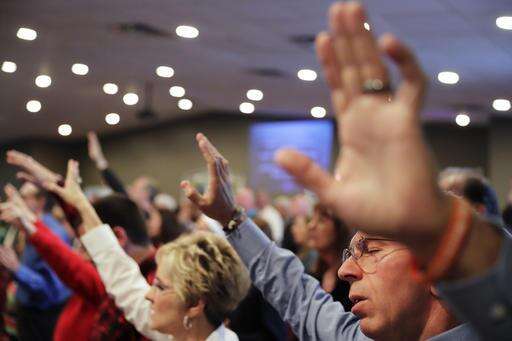
ADVANCE FOR USE THURSDAY, JUNE 9, 2016 AND THEREAFTER -In this Sunday April 10, 2016 photo, parishioners pray during a service at the Christian Fellowship Church in Benton, Ky. Religious conservatives could once count on their neighbors to at least share their view of marriage. Those days are gone. Public opinion on same-sex relationships had turned against conservatives even before the U.S. Supreme Court legalized gay marriage nationwide last year. (AP Photo/David Goldman)
The Associated Press

ADVANCE FOR USE THURSDAY, JUNE 9, 2016 AND THEREAFTER -In this Sunday April 10, 2016 photo, parishioner Megan Wagner bows her head in prayer during a service at the Christian Fellowship Church in Benton, Ky. Many evangelicals say liberals want to seal their cultural victory by silencing the church. Liberals call this paranoid. But evangelicals see evidence of the threat in every new uproar over someone asserting a right to refuse recognition of same-sex marriages, whether it be a baker, a government clerk, or the leaders of religious charities and schools. (AP Photo/David Goldman)
The Associated Press
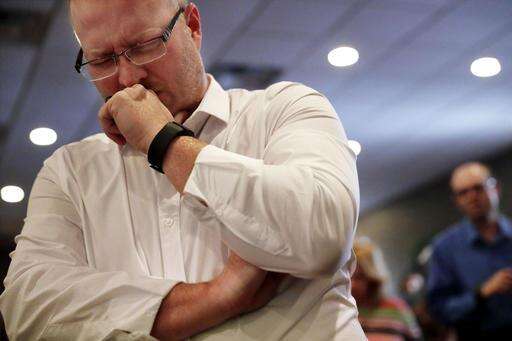
ADVANCE FOR USE THURSDAY, JUNE 9, 2016 AND THEREAFTER -In this Sunday April 10, 2016 photo, lead pastor Richie Clendenen speaks during a service at the Christian Fellowship Church in Benton, Ky. "The Bible says in this life you will have troubles, you will have persecutions. And Jesus takes it a step further: You'll be hated by all nations for my namesake. Let me tell you," Clendenen said, "that time is here." Amid nods and cries of encouragement, he continued: "There's nobody hated more in this nation than Christians. Welcome to America's most wanted: You." (AP Photo/David Goldman)
The Associated Press
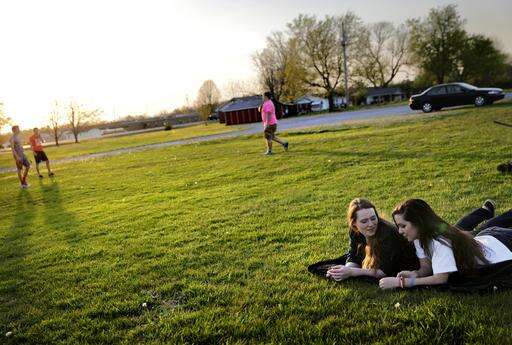
ADVANCE FOR USE THURSDAY, JUNE 9, 2016 AND THEREAFTER -In this Sunday April 10, 2016 photo, Breonna Logothetis, right, and Karlee Phillips, both 16, lay out on the grass during a youth gathering at sunset outside the Christian Fellowship Church in Benton, Ky. The congregation is one of more than 80 in the surrounding community, by pastor Richie Clendenen's count, and a congregant joked the churches here are so packed on Sundays "it's the best time to go to Wal-Mart." (AP Photo/David Goldman)
The Associated Press
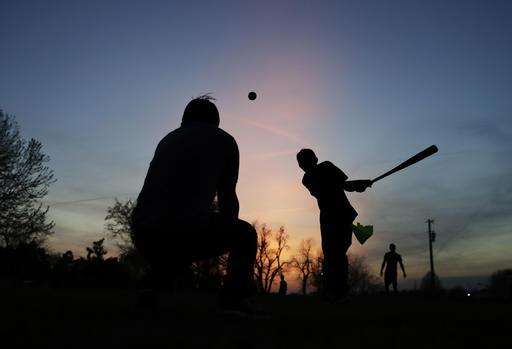
ADVANCE FOR USE THURSDAY, JUNE 9, 2016 AND THEREAFTER -In this Sunday April 10, 2016 photo, youths play a game of wiffleball during a gathering at sunset outside the Christian Fellowship Church in Benton, Ky. In this deeply religious swath of western Kentucky, a state where about half the residents are evangelical, conservative Christians feel under siege. They say that, for decades, they have been steadily pushed to the sidelines of American life and have come under attack for their most deeply held beliefs. (AP Photo/David Goldman)
The Associated Press
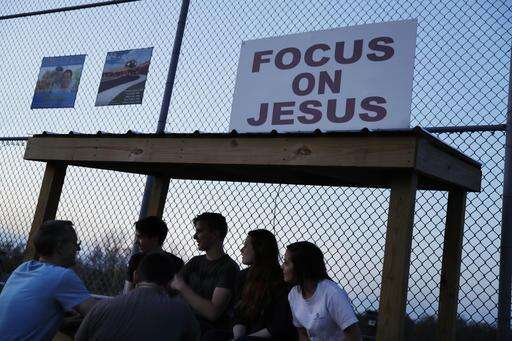
ADVANCE FOR USE THURSDAY, JUNE 9, 2016 AND THEREAFTER -In this Sunday April 10, 2016 photo, youths sit under a sign at a baseball field during a gathering at dusk outside the Christian Fellowship Church in Benton, Ky. For evangelicals, like those at Christian Fellowship, the sense of a painful reckoning is not just imagined; their declining clout in public life can be measured. The turnabout is astonishing and hard to grasp, for them and for other Americans, since the U.S. remains solidly religious and Christian, and evangelicals are still a formidable bloc in the Republican Party. But a series of losses in church membership and in public policy battles, along with America's changing demographics, are weakening evangelical influence, even in some of the most conservative regions of the country. (AP Photo/David Goldman)
The Associated Press
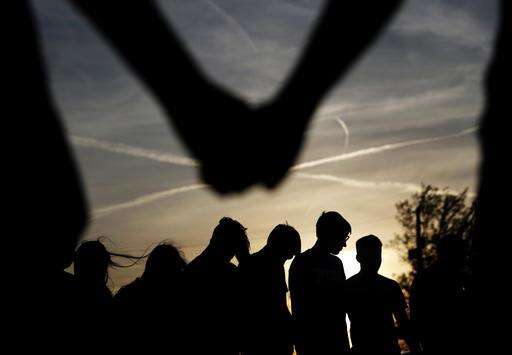
ADVANCE FOR USE THURSDAY, JUNE 9, 2016 AND THEREAFTER -In this Sunday April 10, 2016 photo, youths hold hands for a prayer during a gathering at sunset outside the Christian Fellowship Church in Benton, Ky. Nearly a quarter of Americans say they no longer affiliate with a faith tradition. It's the highest share ever recorded in surveys, indicating the stigma for not being religious has eased, even in heavily evangelical areas. Americans who say they have no ties to organized religion, dubbed "nones," now make up about 23 percent of the population, just behind evangelicals, who comprise about 25 percent, according to the Pew Research Center. (AP Photo/David Goldman)
The Associated Press
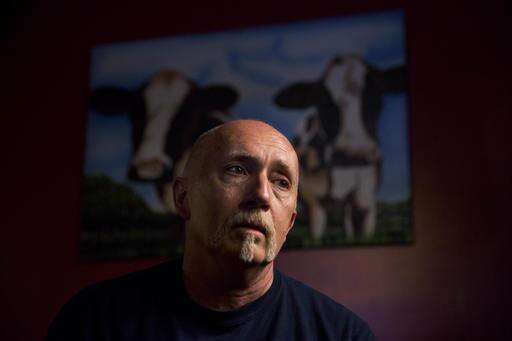
ADVANCE FOR USE THURSDAY, JUNE 9, 2016 AND THEREAFTER -In this Monday, April 11, 2016 photo, Daniel Slayden, owner of Parcell's Deli, Grille and Bakery, sits for a portrait after the lunchtime rush at his business in Benton, Ky. "If a homosexual couple comes in and wants a cake, then that's fine. I mean I'll do it as long as I'm free to speak my truth to them," said Slayden, taking a break after the lunchtime rush. "I don't want to get any point to where I have to say or accept that their belief is the truth." (AP Photo/David Goldman)
The Associated Press
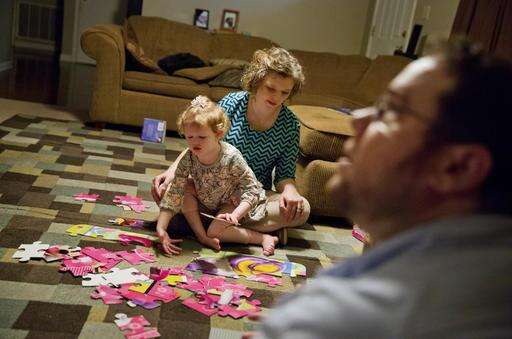
ADVANCE FOR USE THURSDAY, JUNE 9, 2016 AND THEREAFTER -In this Monday, April 11, 2016 photo, Brandi, rear and Chris Haynes, near, sit on the living room floor of their home as their daughter, Evie, 3, puts a puzzle together in Murray, Ky. Haynes, who plays in the church worship band and teaches communications at Murray State, said he voted for John Kasich in the primary. Haynes said Trump brings out the worst in people. "It's like we're scraping the bottom of the barrel,'' said Brandi. (AP Photo/David Goldman)
The Associated Press
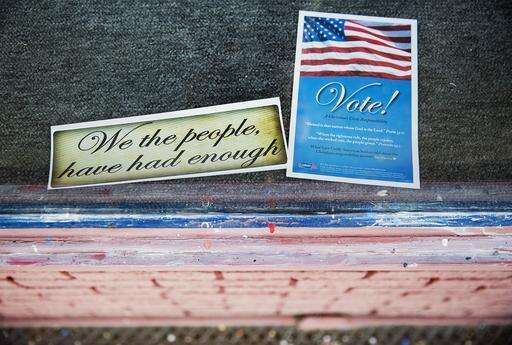
ADVANCE FOR USE THURSDAY, JUNE 9, 2016 AND THEREAFTER -In this Sunday April 10, 2016 photo, leaflets sit in the window of the local Republican party office in Benton, Ky. Politically, old guard religious right organizations, such as the Moral Majority and the Christian Coalition, are greatly diminished or altogether gone, and no broadly unifying leader or organization has replaced them. In this year's presidential race, the social policy issues championed by Christian conservatives are not central, even amid the furor over bathroom access for transgender people. (AP Photo/David Goldman)
The Associated Press
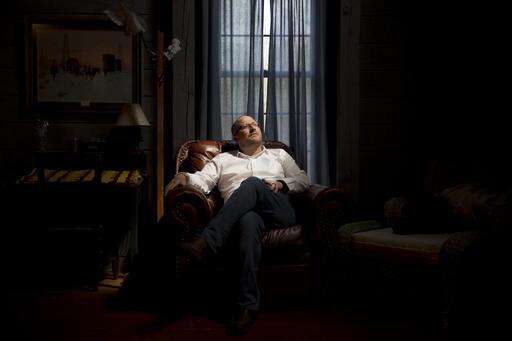
ADVANCE FOR USE THURSDAY, JUNE 9, 2016 AND THEREAFTER -In this Sunday April 10, 2016 photo, Richie Clendenen, lead pastor at Christian Fellowship Church, is photographed for a portrait after conducting a service, in Benton, Ky. No issue has more starkly illuminated conservative Christians' waning influence than the struggle over same-sex marriage. Clendenen said he saw "a lot of fear, a lot of anger" in his church after the Supreme Court ruling. He said it made him feel that Christians like him had been pushed to the edge of a cliff. (AP Photo/David Goldman)
The Associated Press
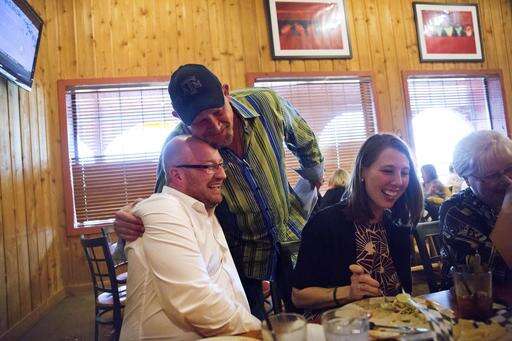
ADVANCE FOR USE THURSDAY, JUNE 9, 2016 AND THEREAFTER -In this Sunday April 10, 2016 photo, Richie Clendenen, lead pastor at Christian Fellowship Church, left, is embraced by congregant Judd Deaton, after a service while dining with his wife Jenny at a restaurant in Benton, Ky. Clendenen prays for President Barack Obama, considering it a Christian duty no matter his opposition to the president's policies. But Clendenen believes few Americans who support same-sex marriage would show him or his fellow evangelicals a similar level of respect. ''On any front that we speak on, we're given this label of intolerance, we're given this label of hate," Clendenen said. (AP Photo/David Goldman)
The Associated Press
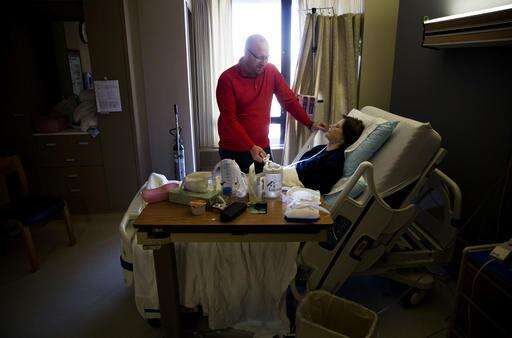
ADVANCE FOR USE THURSDAY, JUNE 9, 2016 AND THEREAFTER -In this Tuesday, April 12, 2016 photo, Richie Clendenen, lead pastor at Christian Fellowship Church, top, prays with congregant Cathy Rutledge in the hospital as she recovers from a bout of pneumonia in Paducah, Ky. Clendenen uses the word persecution to describe what Christians are facing in the U.S., even though he feels strange doing so. He has traveled extensively to help start churches in other countries, and knows the violence many Christians endure. (AP Photo/David Goldman)
The Associated Press
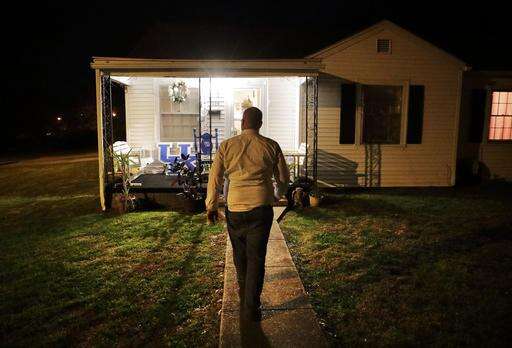
ADVANCE FOR USE THURSDAY, JUNE 9, 2016 AND THEREAFTER -In this Sunday April 10, 2016 photo, Richie Clendenen, lead pastor at Christian Fellowship Church, returns home after conducting an evening service, in Benton, Ky. Clendenen, 38, came of age when the religious right was at its apex, and he concluded any mix of partisan politics with Christianity was toxic for the church. A congregant once lobbied him to participate in Pulpit Freedom Sunday, an annual conservative effort to defy IRS rules against backing politicians from the pulpit. Clendenen stood before the congregation and endorsed ... Jesus. (AP Photo/David Goldman)
The Associated Press
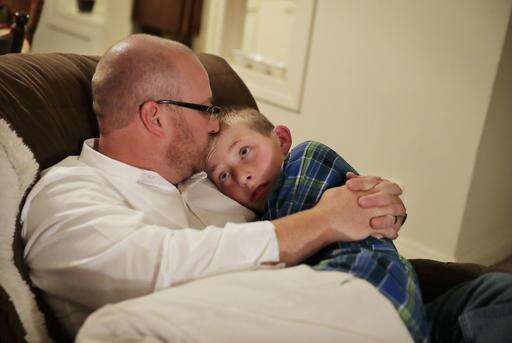
ADVANCE FOR USE THURSDAY, JUNE 9, 2016 AND THEREAFTER -In this Sunday April 10, 2016 photo, Richie Clendenen, lead pastor at Christian Fellowship Church, holds his son Trey, 11, after returning home from conducting an evening service, in Benton, Ky. "I feel like we're being made to accept everything that everybody else has said," explained Clendenen, "but at the same time our ideas, the truth that we hold so dear and the word of God isn't being tolerated whatsoever." (AP Photo/David Goldman)
The Associated Press
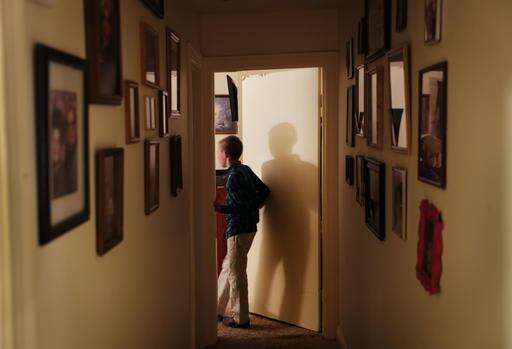
ADVANCE FOR USE THURSDAY, JUNE 9, 2016 AND THEREAFTER -In this Sunday April 10, 2016 photo, Trey Clendenen walks into his room before going to bed in Benton, Ky. In this deeply religious swath of western Kentucky, a state where about half the residents are evangelical, conservative Christians feel under siege. They say that, for decades, they have been steadily pushed to the sidelines of American life and have come under attack for their most deeply held beliefs. (AP Photo/David Goldman)
The Associated Press
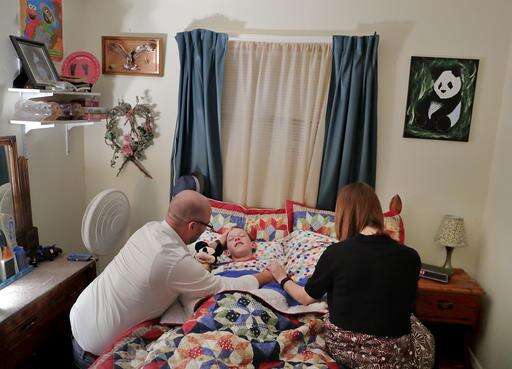
ADVANCE FOR USE THURSDAY, JUNE 9, 2016 AND THEREAFTER -In this Sunday April 10, 2016 photo, Richie Clendenen, lead pastor at Christian Fellowship Church, left, and his wife Jenny, say their evening prayers with their son Trey, 11, as he goes to bed at their home in Benton, Ky. "I worry about the country he's going to inherent. I feel our rights are slowly being taken away from us," said Richie Clendenen in regards to his son Trey. "I pray if Christianity could lose all rights in his future, I question what that's going to mean for him?" (AP Photo/David Goldman)
The Associated Press